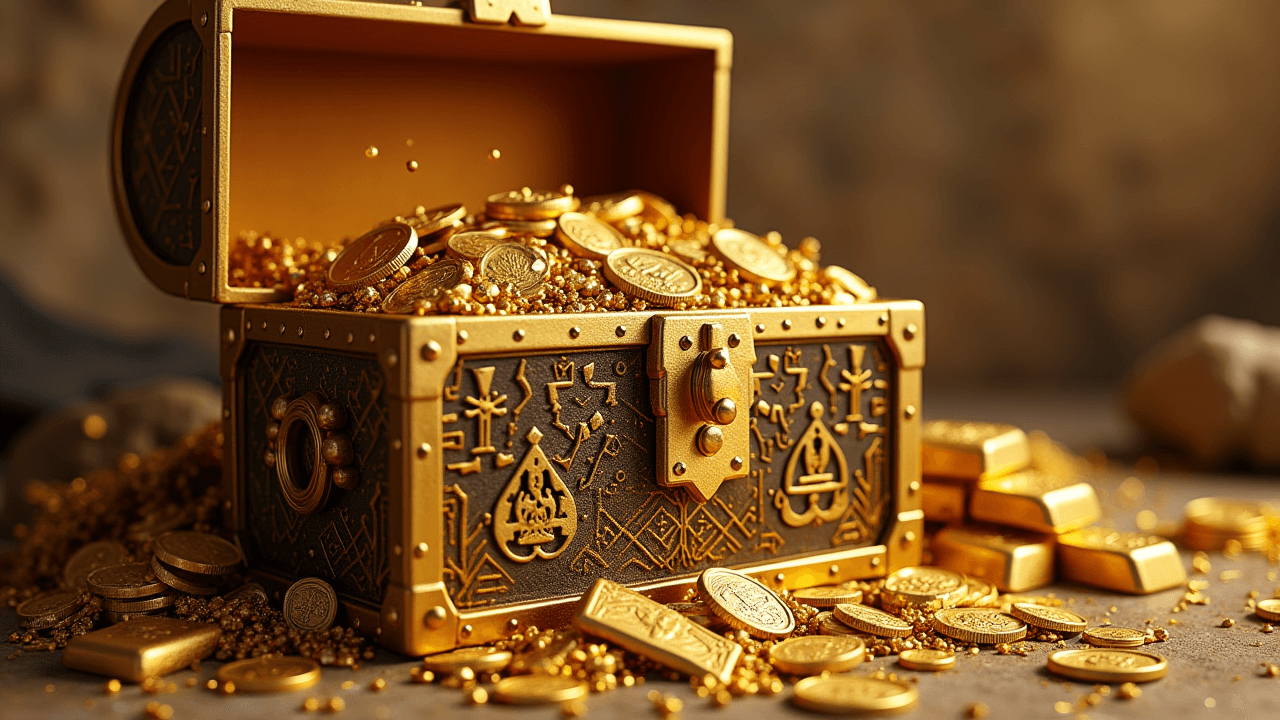Okay, so let’s say you got all the gold ever mined, like ever in history, and you put it all in one place. You’d think it’d be this massive mountain of gold, right? Like something out of a movie. Yeah, you’d expect something huge. Forget this. It’d probably only be enough to fill up something like the Washington Monument. It’s true. It really puts things in perspective, right? You hear all the gold in the world, and it’s not this infinite thing.
Exactly. It’s this thing that’s obsessed people for like, I mean, all of history, basically. And our listener, you know, they get that. They’ve been digging into basic explanations about gold, really trying to get to the bottom of it. Those simple threads are great for a starting point, exactly. You kind of get the basics, but you’re ready to level up your understanding. You want the nuance, exactly. You want to know why it’s so valuable, how it’s different from, like, Bitcoin or whatever. And like, why should we even care about gold today?
Gold’s Longevity and Lasting Value
One thing that always comes up with gold is how rare it is, but it’s not that rare, is it? I mean, it’s not like we find a new vein every 100 years. Yeah, that’s interesting, right? It’s this weird balance because if gold was super common, like iron is, would it be as valuable? Probably not. Yeah, if everyone had a gold necklace, would it mean anything?
Exactly. So that scarcity is key. But the other thing about gold is it lasts. I mean, it doesn’t just rust or decay like a lot of other metals do. It’s like that saying, “they aren’t making any more land,” yeah. Except they are making more gold just super slowly, yeah, just a tiny bit here and there over millions of years. And that gradual increase in supply is important. It’s part of what makes it a reliable store of value. Unlike, say, a banana or potato, right? Those things rot. Gold doesn’t. You could have a gold coin from ancient Rome and it’d still be worth something today. That’s wild to think about—a Roman Emperor holding the same gold coin that, like, I could theoretically hold today.
It’s that connection to the past that makes it so powerful, and that’s what our ancestors were drawn to. It represented something that lasts because everything else decayed. Exactly. It was almost like this divine metal untouched by time. So it’s not surprising that it became associated with Gods and royalty and all that.
Gold as Money and Its Transition
Oh yeah, like King Midas and his golden touch. Makes sense. It’s this thing that’s powerful and permanent, exactly. And that perception, along with the rarity, is what made gold so central to early economies. It went from being shiny to being money pretty quickly.
Well, right? It’s not like you could easily trade something like a cow back then. “Hey, how many chickens for this gold coin?” “That’ll be 17 chickens, please.” No, it just wouldn’t work. But gold, gold, you can divide into smaller pieces. You can melt it down, shape it, make coins exactly even with simple tools. People could make coins that were pretty uniform in size and weight, yeah, and that’s important for trade.
If every gold coin was different, it’d be chaos. Chaos. And then you have the whole issue of purity. How do you know you’re getting a real gold coin and not some cheap imitation? They even had the super strong acid mixture called aqua regia. Aqua regia, that sounds intense. It means royal water because it can dissolve even gold. Imagine figuring that out back then. That’s incredible.
Gold vs. Bitcoin: A Comparison
But okay, so that’s like ancient gold history. But what about today? I mean, like, what about gold reserves? Does that even matter anymore, now that we’re not using the gold standard?
Yeah, that’s a good question, actually. Under the gold standard, the amount of gold a country had directly impacted the value of its currency. More gold equals stronger money, basically. Exactly. It was a way to try and keep things stable, but it also meant governments couldn’t really influence their own economies as much. So, like, what changed?
Well, now most countries use a fiat system, which means our money isn’t actually backed by anything physical, like gold. So, like, what’s it backed by then? Like, good vibes? Kinda. It’s more about things like supply and demand, government policies, and just general confidence in the economy. If everyone freaks out and loses faith in the system, that can actually make fiat currencies less stable.
Yeah, it’s all about trust and perception. But back to the gold. So, like, those reserves, those are just kind of useless?
Now, not entirely. They still have a purpose, even if it’s not as direct. They’re like a safety net for central banks, a hedge against things going haywire. A backup plan, kind of, plus gold still has that intrinsic value that we talked about. So, in times of uncertainty, it can be reassuring for countries to have those reserves.
Okay, I get that, but, like, I’m not gonna lie, I always thought about gold as, like, jewelry or buried pirate treasure, not like propping up the entire financial system, right? It’s not exactly something you see every day, but it’s still a huge part of the global economy. And that actually ties into your question about Bitcoin.
Oh yeah, because, like, everyone comparing them, right? Gold versus Bitcoin, exactly. They’re both seen as stores of value, hedges against inflation, but they work in totally different ways. It’s like comparing apples and like, I don’t even know, something that hasn’t been invented yet.
That’s a good way to put it, because with gold, you have something tangible. You can hold it, touch it, even melt it down if you really wanted to. Please don’t melt down your gold. Only in case of emergencies. Bitcoin only exists digitally, which has its own pros and cons, right?
Yeah. Like, I can bury gold in my backyard, but good luck doing that with the Bitcoin.
Exactly. But then again, Bitcoin is incredibly easy to transfer anywhere in the world, instantly, as long as you have the internet. So it comes down to what you value more, I guess. Like that tangible security of a physical object versus the flexibility of the digital world.
Modern Uses of Gold in Technology
And it’s important to remember, gold has this incredibly long track record. We’re talking thousands of years of history here. Bitcoin is like the new kid on the block, exactly. Gold has been through countless economic ups and downs, and it’s still here. It’s proven its resilience, and I think that’s reflected even in how we talk about it, like “good as gold.” Exactly when we want to say something is truly valuable, that’s the phrase we use. It speaks to how deeply gold is embedded in our culture.
Speaking of gold being embedded, did you know it’s actually used in electronics?
Yeah, like my phone apparently has gold in it.
Wait, really? So it’s not just like rings and necklaces?
Nope. Gold is actually super important in all sorts of tech these days, huh?
Who knew? It all comes down to its properties. Gold is an amazing conductor of electricity, like one of the best there is. So, like, it helps the electricity flow better in my phone. Exactly. You’ve got these tiny little bits of gold in the circuit boards, the connectors, all these little parts you never see. And that makes my phone faster, more reliable, too. It helps make sure those electrical signals are zipping around exactly as they should.
Wow. So we’re relying on this ancient metal to power our modern world. It’s kind of poetic when you think about it. We think of gold as this old-fashioned thing, but it’s literally what makes our tech tick.
Makes you wonder what else they’ll use it for, right? Like flying cars, maybe.
Hey, you never know. As technology keeps advancing, who knows what we’ll find out about gold?
That’s true. It’s like we’ve been studying this thing for centuries, and we’re still learning. Exactly. And that actually brings us back to something we talked about earlier, that whole idea of perceived value.
Remember that thought experiment you mentioned?
Oh yes, the trade from a piece of tangible history, or the skill set of your incredibly resourceful neighbor. That’s such a good one, because it really makes you think about what you value.
Exactly. Would you choose the immediate perceived value, the weight of history that comes with gold? Or would you bet on human ingenuity, the ability to adapt and learn and create? That’s a tough one. It’s like choosing between a museum artifact and like a Swiss army knife, and there’s no right or wrong answer. It all depends on your priorities and how you view the world, but it’s a question worth pondering.
It really is. It’s like this perfect example of how gold can make us think differently about value, about history, about our place in the world.
Exactly. And on that note, I think we’ve done a pretty good job of digging into this whole gold thing. What do you think I’d say this deep dive has been a. Dare I say it—good as gold?
I wouldn’t expect anything less.
Yeah, but for our listeners out there, don’t just take our word for it. Go explore those threads. Check out that planet money episode and keep digging. There’s a whole world of gold knowledge out there just waiting to be discovered.
Understanding Gold’s Intrinsic Value
It’s fascinating how something as old as gold still holds so much value today. Its rarity, durability, and historical significance make it a unique asset. Even in our digital age, gold remains a symbol of wealth and stability. Whether it’s in the form of jewelry, coins, or electronic components, gold’s versatility ensures it remains relevant.
Gold’s intrinsic value is not just about its physical properties but also about what it represents. It stands for something enduring and unchanging, a contrast to the fleeting nature of digital currencies and other modern investments. This intrinsic value is why people continue to invest in gold, even when the world around us changes rapidly.
The Role of Gold in Modern Economies
Even though we’re no longer on the gold standard, gold still plays a crucial role in modern economies. Central banks hold gold reserves as a safeguard against economic instability. These reserves provide a sense of security and trust in the financial system. In times of crisis, countries can rely on their gold reserves to back their currency and stabilize their economy.
Gold’s role in the global economy is also reflected in its price and demand. Investors view gold as a safe-haven asset, especially during uncertain times. This demand keeps gold’s value high, ensuring it remains a significant part of the financial landscape.
The Cultural Significance of Gold
Gold’s cultural significance cannot be overlooked. It has been a part of human civilization for thousands of years, symbolizing wealth, power, and prestige. This deep-rooted association with positive attributes makes gold more than just a physical asset; it’s a cultural icon.
From ancient empires to modern societies, gold has been used in rituals, ceremonies, and as a display of status. This cultural attachment adds another layer to gold’s value, making it a timeless treasure that continues to captivate people around the world.
Technological Advancements and Gold’s Future
As technology advances, so does the use of gold. Its excellent conductivity and resistance to corrosion make it indispensable in electronics and other high-tech industries. From smartphones to aerospace engineering, gold plays a vital role in the functionality and reliability of modern devices.
Looking ahead, gold’s applications may expand even further. As new technologies emerge, gold could find new uses that we haven’t yet imagined. This ongoing relevance ensures that gold will continue to be a valuable asset in the future.
Frequently Asked Questions
What makes gold rare?
Gold is rare because it is not commonly found in large quantities. Unlike more abundant metals like iron, gold is found in small quantities and requires significant effort to mine and extract. This scarcity makes gold valuable.
Why does gold last forever?
Gold is highly durable and does not rust or decay like other metals. Its resistance to corrosion and tarnish means it can last for thousands of years without deteriorating, maintaining its value over time.
How was gold used as money historically?
Historically, gold was used as money because it is divisible, portable, and has a consistent value. Gold coins were standardized in size and weight, making them easy to trade and use in commerce.
How does gold compare to Bitcoin as a store of value?
Gold and Bitcoin are both considered stores of value, but they operate differently. Gold is a tangible asset with a long history of value, while Bitcoin is a digital asset that offers flexibility and ease of transfer. Gold is seen as more stable, whereas Bitcoin is more volatile.
What are modern uses of gold in technology?
Gold is used in modern technology primarily because of its excellent conductivity and resistance to corrosion. It is found in electronics like smartphones, computers, and aerospace components, where it ensures reliable and efficient performance.
Your Hosts

Alex & Maria
Join Alex Thompson and Maria Davis as they navigate the fascinating world of knowledge. With their combined expertise and passion for learning, they simplify the complex and make every episode a journey worth taking.

